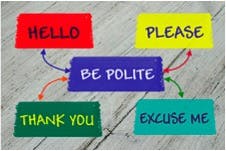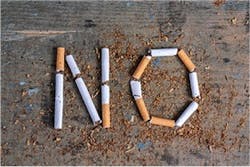Like it or not, etiquette regulates most of the advancement in your career. To a degree, etiquette also controls the quality of your relationships with coworkers and customers. Let's take a look at the fundamentals of HVAC field etiquette most of us forget to consider.
A Little History
The granddaddy of etiquette is an Italian fellow named Baldassare Castiglione (1478-1529). In the year 1500, there was no such thing as etiquette. So when the installers and service techs would enter the king's castle to upgrade the performance of the heating systems, things got really awkward.
To avoid the recurring embarrassment and beheadings for inappropriate behavior before the king, early etiquette was born. Soon, all HVAC professionals began to display with gracious conduct and many were knighted by the king for furnishing exquisite royal comfort. Unfortunately, the HVAC professionals’ version of Castiglione's book that launched the beginning of etiquette has been lost and only his "Book of the Courtier" remains to this day.
HVAC Etiquette, Really?
Although few of us are very tuned-in to etiquette, in reality, it's everywhere. Many dispatchers agree, most customer complaints are a result of a slight technical problem, magnified by an inappropriate response or the poor conduct of a company representative.
Unfortunately their judgment is sometimes executed when they simply decide to call someone else for their next service call or replacement need. If a company representative breaks the rules of etiquette, all the marketing in the world won't win customer loyalty back. You have been dismissed and you don’t even know why.
Here are some basic rules of etiquette that apply across the board. You were hopefully made aware of them as a youngster, but all of us can use a friendly reminder.
Be Clean and Don't Smell Bad
The average hourly rate you charge is probably between $125 and $200 per hour. For that kind of money, you should shower every day, keep a clean shirt in the truck, and have breath that doesn't foul the spark igniter.
Smoking
Because smoking is considered offensive in many people’s homes, there is a whole list of no-no’s associatedIf you must smoke, ask the homeowner where would be permissible. Warning: If the answer is down on the street corner … you have your instructions.
If you smoke, take action to cover up the stink. Also avoid pungent cologne or perfumes -- many people are allergic to strong scents.
Your Language
Remember when you were eight years old and your favorite aunt washed your mouth out with soap when you called your cousin that name? Think about all the other words you’d have to bite the bar for and don’t use them when at a customer’s home or business.
Good etiquette simply demands clean language. Why? Many people are honestly hurt by hearing those type of words. Good etiquette is all about being aware of others feelings and choosing not to offend them.
The Handshake
In the American culture, a handshake is a standard friendly greeting. A bone-crusher handshake can be painful to some people. A dead fish handshake can make you appear weak and show a lack of confidence.
The best approach when shaking hands is to look the person in the eye and match the firmness of the other person's handshake. Keep in mind, several cultures refrain from handshaking, so don't be offended if some people don't take your hand.
Timeliness
Time is more important than money to most people who can afford to hire an HVAC service company. Here are a few rules to follow to be sure you delight your customers and keep your time commitments:
- Be on time. More than 15 minutes early, or 15 minutes late should be preceded by a courtesy call to allow your customer to plan accordingly. When a time is established a reasonable time frame should be set and followed.
- Length of the service call. It's impossible to predict how long some repairs will take. But an initial estimate can be provided if the customer asks. An update can be offered when you’re sure the time needs to be extended
- Communicate with customers. The time required for an installation or system renovation should be discussed at the start of the job. As soon as you see the job time may need to be extended, discuss it with customers so they can adjust their schedules accordingly. Wrapping up the job early usually isn’t a problem.
- Do not discuss politics. Politics are more polarizing than ever, avoid talking about it with customers and co-workers. The odds are 50/50 that your views may be opposite those of your customer.. You may be well worth $200 per hour when diagnosing a system operating at 56% of rated capacity, but customers will soon find out you may not be quite so valuable as a political analyst.
- Cell phone use. According to a recent Forbes article about The Top 27 Rules of Etiquette in a Changing World, 15 of the most common offenses or 56% are directly tied to cell phone usage.
Today, our phones are our open link with the company. Our service calls are dispatched on our phones. If we need help from a supervisor, they are available by tapping a button. Tech support often uses FaceTime. Manufacturer's data is available on our phones through the internet.
But personal calls and personal texts while you're on the customer's dime is disrespectful and should be avoided.
- Avoid using headphones or in-ear devices. Why? It means you're only half there to most customers. Being fully present means you are disconnected from your phone.
If you need to call the office or manufacturer, it may be appropriate to let your customers know ahead of time. Ideally, turn the ringer off when on a job site, if company policy allows it.
Did I Go Too Far?
So, if you’re reading this article and the whole time you’re saying “Falke is crazy, no one is this kind of prude,” you have just qualified yourself as one that needs a stern etiquette lesson right away.
You see, etiquette isn’t about whether your customers should or shouldn’t feel this way each time you break the etiquette rules. Etiquette is about you caring enough not to offend them. Deciding to use good manners shows you have made the decision to care. Companies that require a higher level of conduct of their guys and gals in the field are simply stepping up.
No one can make you use good manners. As you read through this article, you either made the decision to improve your etiquette or not. The hard fact about this strange world of etiquette is it is timeless. You have always and will always be judged by others based on the etiquette principles you choose to adhere to or violate.
Rob “Doc” Falke serves the industry as president of National Comfort Institute -- an HVAC-based training company and membership organization. Doc would really appreciate any feedback, for or against this article. Please contact Doc at [email protected] or call him at 800-633-7058. Go to NCI’s website at nationalcomfortinstitute.com for free information, articles, and downloads.
About the Author
Rob 'Doc' Falke
President
Rob “Doc” Falke serves the industry as president of National Comfort Institute an HVAC-based training company and membership organization. If you're an HVAC contractor or technician interested in a building pressure measurement procedure, contact Doc at [email protected] or call him at 800-633-7058. Go to NCI’s website at NationalComfortInstitute.com for free information, articles and downloads.



